俄语试题及答案解析浙江自考7月
浙江省2007年7月高等教育自学考试-第二外语(德语)试题-课程代码00842

浙江省2007年7月高等教育自学考试德语试题课程代码:00842一、单项选择题(本大题共30小题,每小题1分,共30分)在每小题列出的四个备选项中只有一个是符合题目要求的,请将其代码填写在题后的括号内。
错选、多选或未选均无分。
1. … Wann geben Sie mir mein Geld endlich wieder ? …- 【】… Morgen gebe ich bestimmt zurück. …A. es dirB. es IhnenC. es SieD. dir es2. Ist es erlaubt, einen Freund zu der Party ? 【】A. mitbringenB. bringen mitC. mitzubringenD. zu bringen mit3. Sie wiegt 62 kg und ist 1,78 m . 【】A. großB. hochC. langD.stark4. Man sollte mehr . 【】A. Sport treibenB. Sport machenC. Sport tunD. Sport führen5. 1970 war ich das letztenmal in München. Ich finde, seitdem ist die Stadt viel schöner . 【】A. wordenB. gewesenC. gewordenD. bekomen6. Fahren Sie mit dem Wagen oder gehen Sie ? 【】A. mit FußB. zu FußC. mit FüßenD. auf den Füßen7. Maria muß heute bei bleiben. 【】A. ihre kranke TanteB. seiner kranken TanteC. ihre kranken TanteD. ihrer kranken Tante8. Ich gratuliere dir zum Geburtstag und wünsche dir . 【】A. alle guteB. alles gutC. alles guteD. alles Gute9. Das Büro liegt ganz in der Nähe Bahnhofs. 【】A. vomB. beimC. desD.am10. Wegen dieser dummen Erkältung habe ich die ganzen Feiertage im Bett . 【】A.gelegtB. gebliebenC. gelegenD. gewesen11. Er zog sich aus und legte sich . 【】1 / 7A. im BettB. in BettC. ins BettD. zu Bett12. Ich hatte leider keine Zeit, . 【】A. für das Buch lesenB. für das Buch zu lesenC. das Buch zu lesenD. um das Buch zu lesen13. In den großen Ferien bin ich Schweiz gefahren. 【】A. nachB. in dieC. in derD. in14. Wir fahren am Wochenende oft Meer. 【】A. amB. ansC. insD. nach15. Was ist richtig ? 【】A. Wir haben den ganzen Tag zu Haus geblieben.B. Wir sind den ganzen Tag zu Haus bleiben.C. Wir sind den ganzen Tag zu Haus geblieben.D. Wir haben den ganzen Tag zu Haus gebleibt16. Barbara ist nicht da. Sie ist Freundin gegangen. 【】A. zu seinerB. zu ihremC. zu ihrerD. zu seine17. …Trinkst du gern Wein ? …–… Ja, aber Bier trinke ich noch .… 【】A. mehr gernB. gernerC. am liebstenD. lieber18. Wo steht der Fernsehapparat ? 【】A. in der EckeB. in die EckeC. um die EckeD. vor der Ecke19. Ich bin schon einer Woche hier. 【】A. vorB. bevorC. fürD. seitdem20. Das ist aber ein schönes Geschenk! Ich danke Ihnen herzlich ! 【】A. daranB. dazuC.daraufD. dafür21. Das Wetter in Deutschland war , als ich gedacht hatte. 【】A. so gutB. das besteC. gut soD. besser22. Er hat fünf Glas Whisky getrunken, aber . 【】A. obwohl will er Auto fahren.B. trotz will er Auto fahren.C. dagegen will er Auto fahrenD. trotzdem will er Auto fahren23. Peter ist nicht hier, er ist . 【】A. mit seinem OnkelB. zu seinem Onkel2 / 7C. bei seine OnkelD. bei seinem Onkel24. Man fragt Sie : …Ist dieser Platz noch frei ? “【】Sie antworten : … Nein, er ist schon .…A. besetztB. unfreiC. gehaltenD. gegeben25. Ich kenne ihn erst . 【】A. seit zwei TagenB. nach zwei TagenC. vor zwei TagenD. an zwei Tagen26. Wie du denn mein neues Kleid ? 【】A. hältstB. denkstC. gefälltD. Findest27. Wißt ihr denn schon, ihr im Urlaub fahren wollt ? 【】A. woherB. wozuC. wohinD. wonach28. Ich interessiere mich nicht Politik. 【】A. fürB. umC. anD. mit29. Warum stehen Sie denn ? 【】A. Setz dich dochB. Sitzen Sie doch!C. Sitzen Sie sich dochD. Setzen Sie sich doch30. Ich suche ein Zimmer mit Wasser. 【】A. warmB. warmesC. warmenD. warmem二、阅读理解题(共两篇文章,20小题,共计30分, 其中第1题每小题1分,共10 分; 第2题每小题2分, 共20分)1.请按照文章意思回答问题!(每小题1分,共10分)Freizeit und UrlaubReisen gehört zu den beliebtesten Freizeitbeschäftigungen der Deutschen. Viele Deutsche verbringen die Ferien im eigenen Land. Es gibt viele schöne Campingplätze. Die meisten Urlauber gehen aber in die wärmeren südlichen Länder, z.B.Italien, Spanien, Österreich, Frankreich, die Schweiz und die USA. Früher wollten sie sich lieber ausruhen oder ein Sonnenbad nehmen. Heute ziehen viele Menschen den Aktiv-Urlaub mit viel körperlicher Bewegung vor. Sie gehen ins Grüne und genießen die Natur. Auch an Wochenenden ist es so.Es gibt zahlreiche Vereine und Verbände. In der Frezeit kann man Sport treiben, Bücher lesen,3 / 7Hobbykurs besuchen oder etwas anderes machen.Ein normaler deutscher Haushalt gibt heute etwa Fünftel seines Einkommens für die Freizeitgestaltung aus. Dieser Trend zeigt nach oben.1)Was ist die beliebste Beschäftigung der Deutschen in der Freizeit?2)Wo verbringen die Deutschen gern ihre Ferien?3)Wo machen die meisten Deutschen Urlaub?4)Was wollten die Deutschen früher in der Freizeit am liebsten?5)Was wollen sie jetzt?6)Was bedeutet der Aktiv – Urlaub?7)Welche Länder sind die Lieblingsurlaubsländer der Deutschen?8)Was machen die Deutschen an Wochenenden?9)Was machen die Deutschen in ihrer Freizeit noch?10)Wieviel wollen die Deutschen für ihre Freizeitbeschäftigung ausgeben?2.请按照文章意思选出正确答案!(在备选答案中只有一个是正确的,将其选出并把它的题号写在题中空格内,每小题2分,共20分)Die lieben HaustiereHallo Irina,danke für deinen Brief mit den guten Wünschen. Ja, uns geht es gut.Claudia ist gerade vom Kindergeburtstag gekommen. Sie ist so begeistert vom großen Aquarium (鱼缸)mit den vielen schönen Fischen, das sie bei ihrer Freundin gesehen hat.Überhaupt gibt es in unserer Nachbarschaft viele Tiere. Das Nachbarskind Simon hat einen großen Hund. Und Claudias Spielkameraden, Pascal und Manuel, haben eine schöne schwarze Katze mit langhaarigem Fell. Viele im Dorf haben Hasen. So fragen uns unsere Freunde manchmal, ob wir uns nicht ein Haustier anschaffen möchten. Ich bin aber froh, dass Claudia noch mit ihren Stofftieren zufrieden ist. In ihrem Alter kann sie noch keine Verantwortung für ein Haustier übernehmen. Auch wenn das Tier dem Kind gehört, werde ich die Arbeit damit haben! Ja, wie Du siehst, lieben die Deutschen Haustiere! Mehr als jeder dritte Haushalt hat eins oder sogar mehrere. Man sagt, die Haustiere wecken bei den Menschen positive Eigenschaften und steigern die Lebensfreude. In Deutschland leben rund 23 Millionen Haustiere.4 / 7Die Lieblinge der NationEiner Umfrage nach ist der Hund der Liebling der Nation. Den zweiten Platz belegen stolz die Katzen. Viele Leute haben gleich mehrere Katzen. Auch auf Bauernhöfen dürfen Katzen nicht fehlen. Dort sind sie allerdings sehr nützlich, weil sie Mäuse fangen. Auf dem dritten Platz kommen die Fische. Ihnen folgen Hasen und Kaninchen, danach Hamster und Meerschweinchen. Manche Leute entscheiden sich sogar für exotische Tiere, wie Schlangen, Echsen und Schildkröten. Einmal haben wir beim Spaziergang ein kleines schwarzes Ferkel an der Leine gesehen. Vergeblich versuchte ich von weitem die …Hunderasse“ einzuordnen...Dass die Hunde die Lieblinge der Nation sind, habe ich mittlerweile auch festgestellt. Wir haben auch welche im Dorf. Interessant ist aber, dass es in Deutschland keine herrenlosen Hunde gibt, die auf der Straße herumlaufen. Die …Frauchen“ und …Herrchen“müssen sogar nach der V orschrift den Hundekot auf den öffentlichen Plätzen beseitigen. Dafür gibt es an manchen Stellen extra Automaten mit Plastiktüten.Ein teurer SpaßFür die Hundehalter(狗的主人)sind ihre Lieblinge recht kostspielig , allein für Versicherung, Hundesteuer, Impfungen und Futter hat man allerhand zu bezahlen. Es gibt auch Hundesalons, wo man die Hunde besonders pflegen lassen kann. Und wenn man verreist, kann man den Hund in einer Tierpension abgeben.Es kommt allerdings leider auch vor, dass Leute ihre Tiere einfach aussetzen, weil sie sich nicht mehr um sie kümmern wollen. Solche Tiere landen dann meist im Tierheim.Die Tierhalter finden in Supermärkten und extra Tier-Fachgeschäften eine große Auswahl von Tierartikeln (z.B. Futter, Käfige, Hundehalsband usw.)Bevor man sich für ein Haustier entscheidet, sollte man sich diesen Schritt sehr gut überlegen. Man braucht viel Zeit, weil z.B. die Hunde oft spazieren gehen wollen. Man muss tolerant sein, wenn Hundepfoten ihre Spuren hinterlassen oder wenn Hundehaare auf dem Teppich liegen. Alle Haustiere, besonders Hunde und Katzen, brauchen viel Liebe und Zuwendung .Soviel für heute,deine Elena1. Claudia .A. meine TochterB. meine SchwesterC. mein SpielkameradenD. mein Nachbarn5 / 72. Claudia ist zufrieden mit .A. dem StofftierB. KatzenC. HundenD. Aquarium3. Wir leben .A. in einer großen Stadt.B. in einer kleinen StadtC. auf dem LandD. in Russland4. Die Deutschen .A. lieben Haustiere, trägt aber keine Verantwortung dafür.B. lieben Haustiere nicht, trägt aber die Verantwortung dafür.C. lieben Haustiere, trägt auch die Verantwortung dafür.D. wollen die Haustiere nicht haben.5. Der Liebling der Nation istA. der HundB. die KatzeC. SchlangeD. Pferd6. Einen Hund zu haben, ist .A. nicht teuerB. teuerC. billigD. sehr billig7. Als Hundehalter muss man .A. nichts bezahlenB. nicht allein für Versicherung, Hundesteuer, Impfungen und Futter bezahlen.C. allein für Versicherung, Hundesteuer, Impfungen und Futter bezahlenD. sich nicht um seinen Hund kümmern.8. Was ist Hundesalon?A. ein Geschäft für Hundehalter.B. ein Laden für HundartikelnC. ein TierheimD. wo man die Hunde besonders pflegen lassen kann9. Bevor man sich für ein Haustier entscheidet,A. braucht man keine Zeit zu haben.B. kann man ihr Haustier irgendwo aussetzen.C. muss man sich nicht um es kümmern.D. sollte man sich diesen Schritt sehr gut überlegen.10. Gegenüber Haustier muss man .A. tolerant seinB. nicht tolerant seinC. keine Zeit habenD. keine Liebe haben6 / 7三、德译中!(请将划线部分翻译成汉语。
浙江7月自考汉语基础试题及答案解析
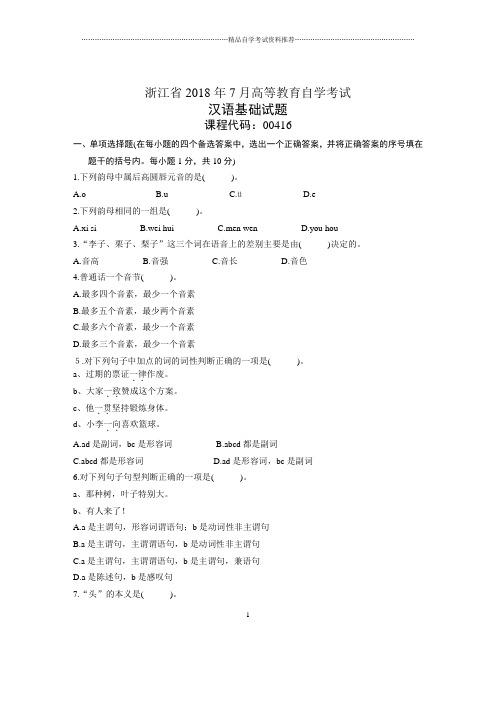
浙江省2018年7月高等教育自学考试汉语基础试题课程代码:00416一、单项选择题(在每小题的四个备选答案中,选出一个正确答案,并将正确答案的序号填在题干的括号内。
每小题1分,共10分)1.下列韵母中属后高圆唇元音的是( )。
A.oB.uC.üD.e2.下列韵母相同的一组是( )。
A.xi siB.wei huiC.men wenD.you hou3.“李子、栗子、梨子”这三个词在语音上的差别主要是由( )决定的。
A.音高B.音强C.音长D.音色4.普通话一个音节( )。
A.最多四个音素,最少一个音素B.最多五个音素,最少两个音素C.最多六个音素,最少一个音素D.最多三个音素,最少一个音素5.对下列句子中加点的词的词性判断正确的一项是( )。
a、过期的票证一律..作废。
b、大家一致..赞成这个方案。
c、他一贯..坚持锻炼身体。
d、小李一向..喜欢篮球。
A.ad是副词,bc是形容词B.abcd都是副词C.abcd都是形容词D.ad是形容词,bc是副词6.对下列句子句型判断正确的一项是( )。
a、那种树,叶子特别大。
b、有人来了!A.a是主谓句,形容词谓语句;b是动词性非主谓句B.a是主谓句,主谓谓语句,b是动词性非主谓句C.a是主谓句,主谓谓语句,b是主谓句,兼语句D.a是陈述句,b是感叹句7.“头”的本义是( )。
1A.物体的顶端或两端B.人体的最上部或动物体的最前部C.第一D.头领、头目8.下列各组汉字不是古今字的一组是( )。
A.见现B.知智C.莫幕D.内纳9.下列各组汉字中全是形声字的一组是( )。
A.信倒休体B.樟林柏榴C.络织绫纲D.看眉盲睁10.下列句子中加点的词是( )。
a、于是废先王之道,燔百家之言,以愚.黔首。
b、天下云.集响.应,赢粮而景.从。
A.a形容词的使动用法,b“云、响”名词用作状语,“景”名词的一般用法B.a形容词的使动用法,b名词用作动词C.a形容词的意动用法,b名词用作状语D.a形容词的使动用法,b名词用作状语二、多项选择题(在每小题的五个备选答案中,选出二至五个正确的答案,并将正确答案的序号分别填在题干的括号内,多选、少选、错选均不得分。
7月浙江自考语言与文化试题及答案解析
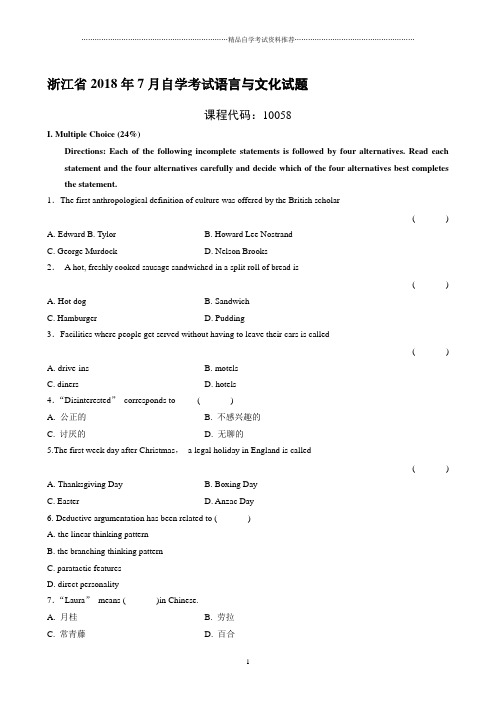
浙江省2018年7月自学考试语言与文化试题课程代码:10058I. Multiple Choice (24%)Directions: Each of the following incomplete statements is followed by four alternatives. Read each statement and the four alternatives carefully and decide which of the four alternatives best completes the statement.1.The first anthropological definition of culture was offered by the British scholar( ) A. Edward B. Tylor B. Howard Lee NostrandC. George MurdockD. Nelson Brooks2.A hot, freshly cooked sausage sandwiched in a split roll of bread is( ) A. Hot dog B. SandwichC. HamburgerD. Pudding3.Facilities where people get served without having to leave their cars is called( ) A. drive-ins B. motelsC. dinersD. hotels4.“Disinterested”corresponds to ( )A. 公正的B. 不感兴趣的C. 讨厌的D. 无聊的5.The first week day after Christmas,a legal holiday in England is called( ) A. Thanksgiving Day B. Boxing DayC. EasterD. Anzac Day6. Deductive argumentation has been related to ( )A. the linear thinking patternB. the branching thinking patternC. paratactic featuresD. direct personality7.“Laura”means ( )in Chinese.A. 月桂B. 劳拉C. 常青藤D. 百合8.“Henry”means ( ) in Chinese.A. 亨利B. 快乐C. 勇敢D. 家庭统治者9.( )can be said as a reply to thanks.A.“ It’s my duty”.B. “It’s my job”.C. “Nothing for that”.D. “You’re welcome”.10.When your English hostess asks you “would you like some more of this dish?”, your answer should be ( ) if you want.A.“Yes, please”.B. “Thank you”.C. “Yes, thank you”.D. “OK”.11.“My knee only hurts when I dance, that’s because I have two left feet”. The last sentence means ( )A. that’s because I have to be independentB. that’s because I have recove red after an illnessC. that’s because I dance swiftlyD. that’s because I am too clumsy12.“To make a cat laugh”is synonymous to ( )A. to be specially ludicrousB. to cause one to feel loathingC. to make a jokeD. to create a wonder13.“To keep one’s nose clean”is the same meaning with ( )A. to keep out of troubleB. to be fond of cleannessC. to separate from othersD. to feel fresh air14.“From whipping post to pillory”is related to( )A. individualismB. English literatureC. the history of EnglandD. Bible15.“Hit and run”derived from( )A. baseballB. footballC. horse racingD. boxing16. “That idea won’t sell” illustrates the metaphor that( )A. ideas are productsB. ideas are commoditiesC. ideas are moneyD. ideas are resources17. “Waving a red flag” means ( )A. doing something that could stop othersB. doing something that could cause other people’s attentionC. doing something that celebrates an event of happinessD. doing something that could cause quick anger in other people18. “A black spot” is a place ( )A. where unpleasant things occur regularly and without chance of improvementB. where everything is decorated in black colorC. where people use to honor something or somebodyD. where people are due to have bad fortune19. The Chinese equivalent for “blue film” is( )A. 伤感电影B. 黄色电影C. 蓝色电影D. 暴力电影20. “Red blooded” corresponds to ( )A. 精力充沛的B. 现行犯的C. 共产党人的D. 红色政权的21. “( ) ” can be got as a reply when you ask an English speaker questions such as “how old are you?”, etc.A. None of your businessB. I’m afraid I can’t tell youC. I’m thirty, thank youD. I’m sorry I don’t remember22.It is often said that Chinese learners of English speak( ) English because they learn it mainly through reading.A. bookishB. excellentC. standardD. common23.In American English “cookie”is a loan word from Dutch, meaning ( ) in Chinese.A. 炊具B. 厨师C. 曲奇饼干D. 厨房24. “Crossing one’s forefinger and middle finger” signifies() in English speaking countries.A. good luckB. sadnessC. respectsD. secrecyII. Gap-filling (10%)Directions: Each of the following statements has an underlined space. Fill in each underlined space with a proper expression.1.There are more than four hundred words for camel in Arabic while there is only one word for it in English or Chinese. It reflects such fact that language is strongly influenced and shaped by _______ .2.The Federal legislature of the USA is_______ .3.The word in British English for “corn”is _______ .4.The contrast between grammatical explicitness in English and grammatical implicitness in Chinese may bebrought about by different _______ traditions of English speaking countries and China.5.English is a hypotactic language and Chinese is a _______ language.6._______ refers to a meek person who submits to indignities and sufferings without any thought or act of rebelling.7.The English equivalent for “对牛弹琴”is “_______ ”.8.The English equivalent for “黑货”is “_______ ”.9.“_______”refers to a strike breaker, someone who accepts work in place of strikers.10.The English speakers who expect a text to be developed_______ may find it difficult to follow a spirally developed text.III. Define the following terms (20%)1.Individualism2.Taboos3.Coherence and cohesion4.Public territoryIV. Translation (16%)1.Red hunter2.Orthodox Eastern Church3.A marriage of convenience4.Even reckoning makes long friends.5.智者千虑,必有一失6.红茶7.白手起家的人8.白菜V.Discuss the following topics (30%)1.How do English speakers bid farewell to one another? What cross-cultural contrasts can you find between English and Chinese farewell?2.What are the English euphemisms for “lavatory”?3.How do you understand the statement that English speakers prefer deductive argumentation while Chinese speakers prefer inductive argumentation when producing argumentative texts?。
(全新整理)7月自考浙江省语言与文化试题及答案解析
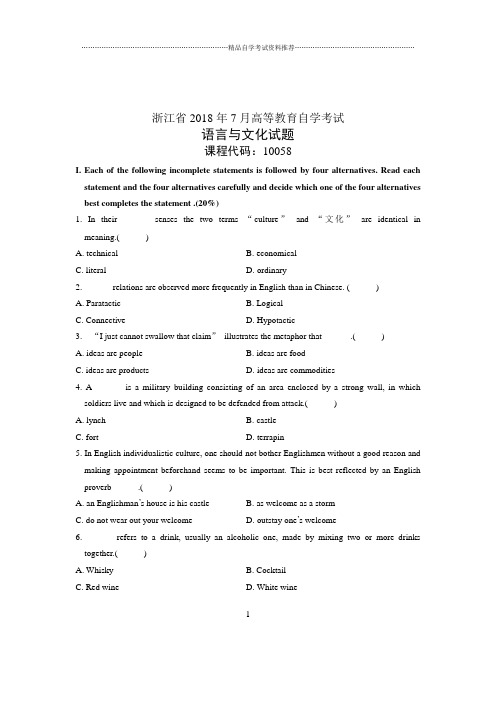
浙江省2018年7月高等教育自学考试语言与文化试题课程代码:10058I. Each of the following incomplete statements is followed by four alternatives. Read each statement and the four alternatives carefully and decide which one of the four alternatives best completes the statement .(20%)1. In their ______ senses the two terms “culture”and “文化”are identical in meaning.( )A. technicalB. economicalC. literalD. ordinary2. ______ relations are observed more frequently in English than in Chinese. ( )A. ParatacticB. LogicalC. ConnectiveD. Hypotactic3. “I just cannot swallow that claim”illustrates the metaphor that ______.( )A. ideas are peopleB. ideas are foodC. ideas are productsD. ideas are commodities4. A ______ is a military building consisting of an area enclosed by a strong wall, in which soldiers live and which is designed to be defended from attack.( )A. lynchB. castleC. fortD. terrapin5. In English individualistic culture, one should not bother Englishmen without a good reason and making appointment beforehand seems to be important. This is best reflected by an English proverb______.( )A. an Englishman’s house is his castleB. as welcome as a stormC. do not wear out your welcomeD. outstay one’s welcome6. ______ refers to a drink, usually an alcoholic one, made by mixing two or more drinks together.( )A. WhiskyB. CocktailC. Red wineD. White wine17. “To know something like the palm of one’s hand”means ______.( )A. to understand the nature of something and be competent in the performance of themB. to understand everything without any questionsC. understand only something easyD. to be thoroughly familiar with the nature and details of something8. When one visits an English speaking friend, one had better not to stay at his home long. This is especially illustrated by a proverb “______”.( )A. a rousing welcomeB. do not wear out your welcomeC. an English’s house is his castleD. as snow in harvest9. 雏菊in English is ______.( )A. daisyB. roseC. sunflowerD. lily10. Good-bye is derived from the expression ______.( )A. “Good luck for you”B. “God bless you”C. “God be with you”D. “Looking forward to seeing you again”11. ______ can be said as a reply to thanks.( )A. “It’s my duty”B. “It’s my job”C. “I have to do it because you are our guest”D. “You’re welcome”12. When you want to compliment the new coat Mary wears you can say ______.( )A. “That’s a very nice coat. It must be very expensive”B. “You look much more beautiful in this coat”C. “How much did you pay fro this coat?”D. “You look lovely in this coat, who bought it for you?”13. When offering another person to be first in going through a door or getting into a car, the normal expression is ______.( )A. “After you”B. “You go first, please”C. “Would you like to go first?”D. “Can you go first, please?”14. When your English hostess asks you “would you like some more of this dish, you answered2______ if you like”.( )A. “Thank you”B. “Yes, thank you”C. “Yes, please”D. “OK”15. “He devoured the book”is a metaphorical expression about ideas which means ______.( )A. he likes the book so muchB. he diagrams the bookC. he reads the book quickly and eagerlyD. he corrects the book16. “A white Christmas”refers to ______.( )A. snow at Christmas timeB. purity at Christmas timeC. innocence at Christmas timeD. nothing done at Christmas time17. “A white hope”refers to ______. ( )A. a talent person who is thought not likely to bring successB. a talent person who is thought likely to failC. a talent person who is thought likely to bring bad fateD. a talent person who is thought likely to bring success18. “‘Tickets, please!’said the guard, putting his head at the window. In a moment everybody was holding out a ticket”demonstrates ______ relation between the two sentences. ( ) A. causal B. a temporalC. an additiveD. an adversative19. In most English letters of request, ______.( )A. the request precedes the supporting informationB. the request follows the supporting informationC. the initial request has to be made paving the way for the final requestD. the request is placed at the end of a letter20. “Frozen”is one of five features of oral English, taking “______”as an example.( )A. visitors should go up the stairs at onceB. visitors should make their way at once to the upper floor by way of staircaseC. up you go, chapsD. time you all went upstairs, nowII. Each of the following incomplete statements is followed by four alternatives. Read each3statement and the four alternatives carefully and decide which alternative can complete the statement. (10%)1. “Propaganda”refers to information, ideas, opinions or images, often only giving one part of an argument, which are broadcast, published or in some other way spread with the intention of influencing people’s opinions. In English culture indicates mainly ______.( )A. disapprovingB. approvingC. neutral attitudeD. ambiguous attitude2. The word in American English for “wagon”is ______.( )A. truckB. lorryC. cargoD. waggon3. The British English equivalent for “公立学校”is ______.( )A. public schoolB. council schoolC. private schoolD. grade school4. The American English equivalent for “公立学校”is ______.( )A. public schoolB. council schoolC. private schoolD. grade school5. ______ can be viewed as occurring whenever as individual communicates without the use of sounds.( )A. Non-verbal communicationB. Facial expressionsC. GesturesD. Posture6. When signifying “come here”, English speakers would ______. ( )A. extend their open hands, palms down, towards the person with all fingers crooked in abeckoning motionB. extend their closed hands, palms up, with only their forefingers moving back and forthC. extend their open hands, palms up, towards the person with all fingers crooked in a beckoningmotionD. extend their open hands, palms down, with only their forefingers moving back and forth7. “I’m full”is signified in English culture by ______.( )A. one or both open hands lightly patting one’s own stomachB. a raised open hand, palm forward4C. an open hand, palm down, raised to one’s throatD. moving quickly his open hand, palm down, across his throat8. “Hitchhiking”is symbolized by ______ in English culture.( )A. a raised open hand, palm forwardsB. moving several times the hand whose forefinger touches one’s own cheekC. moving several times the hand whose thumb touches one’s own cheekD. moving several times a closed hand with an outstretched thumb pointing to the direction in which one tends to travel9. “Chewing one’s finger nails”signifies ______. ( )A. emotional stressB. argumentC. impatienceD. frustration10. “Wagging one’s forefinger”is used to ______.( )A. show one’s angry or frustrationB. warn others not to do somethingC. show one’s defiance and contemptD. express one’s impatienceIII. Each of the following statements has an underlined space. Fill in each underlined space with a proper expression (12%).1. ______ is the study of facial expressions, touch, time, gestures, smile, eye behavior and so on.2. Some English gestures mirror the English alphabet, such as the OK gesture and the ______ gesture.3. The British English equivalent for “quartet”is ______.4. The American English equivalent for “cheque”is ______.5. The English speaking population view frequent use of ______ as bad.6. The “______”English refers to those basic English items that appear in most or all varieties of English.7. “Industrial action”is a euphemism for ______.8. “Slums”or “ghettos”where the poor and the colored races live may be referred to as ______.9. ______ is an equivalent for “ugly”.10. ______ refers to a day specially looked forward to when something remarkable and usually pleasurable will happen.511. ______ is a lie which does not harm and is merely more convenient or polite than telling the truth.12. ______ refers to a cruel, greedy, money grabbing person who will go to no ends to gain wealth.IV. Answer the following questions briefly. (12%)1. A girl may smile to a male stranger. What different interpretation for this phenomenon can you find in both English and Chinese culture?2. What is personal space? What are its qualities?3. What are the five categories of touch?4. Why do some Chinese learners of English often speak bookish English?5. In what way does oral English differ from written English?6. What should Chinese learners of English have to learn if they want to be able to produce cohesive texts?7. Is “you praised you too much”appropriate if said as a reply to praise like “your English is very good”? If it is not, what would you say in the same situation?8. What is racism? And what are racist languages? Can you cite two examples?9. Is it appropriate to call a woman in fifties grandma? Why or why not?10. How do you say “拙作”in English?11. How do you say “请赐教”in English?12. What are “yellow pages”?V. Translation (16%)A: Translate the following into Chinese (8%)1. To put ones foot in ones mouth2. Man proposes, God disposes3. Life is but a walking shadow4. Even reckoning makes long friendsB: Translate the following into English (8%)5. 您有何贵干?6. 久仰,久仰大名。
浙江7月自考现代汉语试题及答案解析

浙江省2018年7月高等教育自学考试现代汉语试题课程代码:00535一、单项选择题(在每小题的四个备选答案中,选出一个正确答案,并将正确答案的序号填在题干的括号内。
每小题1分,共20分)1.从语言学角度看,口语和书面语的差别主要在( )方面。
A.词语的使用上B.句子的长度上C.结构的完整与否D.风格2.从( )的有无上,可以反映出现代汉语与其他语言在语音上的差别。
A.元音B.辅音C.声调D.音节3.元音i与u的区别主要是由于( )造成的。
A.音高B.音色C.音强D.音长4.普通话语音里最小的单位是( )。
A.音素B.音节C.音位D.韵母5.下列( )词语在拼音时需要使用隔音符号。
A.西安B.下雨C.排污D.老爷6.下列音节中都属于零声母音节的是( )。
A.跳舞B.安徽C.五味D.温州7.“米老鼠”一词连读时前两个音节的声调的实际调值是( )。
A.半上、半上B.半上、阳平C.阳平、半上D.阳平、阳平8.下列给“乘车”所作的拼音形式完全正确的是( )。
A.céngchēB.chéngcēC.chèngchēD.chéngchē9.下列成语中有错别字的是( )。
A.按部就班B.水到渠成C.一愁莫展D.乘风破浪10.下面的形声字中,形旁已完全不能表意的是( )。
A.鲸、杯B.江、河C.怨、恨D.课、桌11.下列判断中,( )不是熟语的特征。
A.具有短语的属性B.意义有整体性C.格式和构成成分比较固定D.功能相当于词12.从构词法来说,“灿烂”与下面( )是相同的类型。
A.学习B.徘徊C.动静D.反正13.下列词中都是外来词的一组是( )。
1A.基因、电灯B.葡萄、民主C.沙发、电脑D.引擎、T-恤14.下列加点的字属于词缀的是( )。
A.砖头.B.虾子.(zǐ)C.烟头.D.变化.15.下列所列语法特点中,( )条是不属于形容词的。
A.一般能做谓语B.能受副词修饰C.能做定语D.能与介词结合构成介词短语16.下列短语中属于述宾短语的是( )。
7月浙江自考翻译试卷及答案解析

7月浙江自考翻译试卷及答案解析浙江省2019年7月高等教育自学考试翻译试题课程代码:10050请将答案填在答题纸相应位置上。
Ⅰ.词语翻译20%1.将下列词语译成汉语:1)the Grand Canal 2)used to3)hand labour 4)the Department of Agriculture5)the Aswan High Dam 6)infertile eggs7)assimilate to its own nationals 8)court of appeals9)as to some extent 10)enhance mutual understanding2.将下列词语译成英语:11)灯塔12)差距13)复垦14)惊异15)跑上跑下16)落汤鸡17)大雨像瓢泼一样18)不称霸19)就…而言20)岛屿岸线Ⅱ.改错题10%下列单句译文有差错,请加以改正,并将正确的译文写在答题纸上。
1.And if, with the decay of vitality, weariness increases, the thought of rest will be not unwelcome. 译文:如果随着精力的衰退,日见倦怠,就会觉得长眠真是一件好事。
2.Many children were playing close to the water, and we were stunned by their ignorance anddaring.译文:那一天,许多孩子在靠近水边的地方玩耍,他们那样大胆,那样无知,使我们非常吃惊。
3.The stock of foreign investment grew from under $ 5 billion in 1989 to nearly $90 billion by1994.译文:外资存量从1989年不足5亿美元上升到1994年的近90亿美元。
俄语特长生考试题库及答案
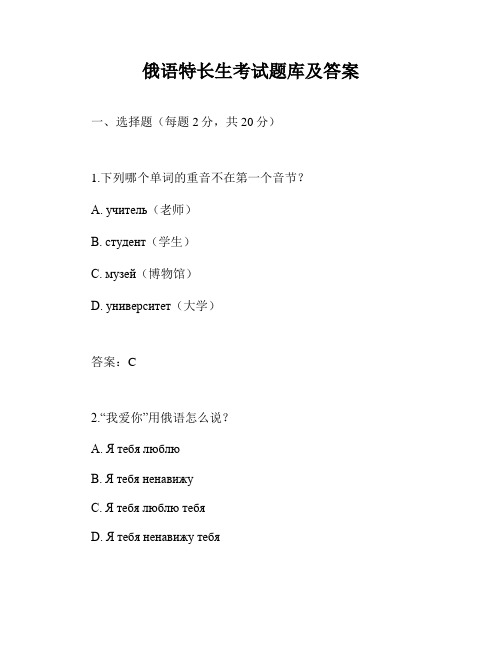
俄语特长生考试题库及答案一、选择题(每题2分,共20分)1.下列哪个单词的重音不在第一个音节?A. учитель(老师)B. студент(学生)C. музей(博物馆)D. университет(大学)答案:C2.“我爱你”用俄语怎么说?A. Я тебя люблюB. Я тебя ненавижуC. Я тебя люблю тебяD. Я тебя ненавижу тебя答案:A3.下列哪个单词不是动词?A. читать(读)B. писать(写)C. книга(书)D. говорить(说)答案:C4.“你好吗?”用俄语怎么说?A. Как дела?B. Как ты?C. Как хорошо?D. Как плохо?答案:A5.下列哪个单词的意思是“图书馆”?A. библиотекаB. музейC. университетD. театр答案:A6.“谢谢”用俄语怎么说?A. спасибоB. извинитеC. пожалуйстаD. прошу答案:A7.下列哪个单词的意思是“红色”?A. красныйC. зеленыйD. желтый答案:A8.“再见”用俄语怎么说?A. до свиданияB. приветC. пожалуйстаD. спасибо答案:A9.下列哪个单词的意思是“音乐”?A. музыкаB. литератураC. искусство答案:A10.“你叫什么名字?”用俄语怎么说?A. Как тебя зовут?B. Как тебя любят?C. Как тебя знают?D. Как тебя видели?答案:A二、填空题(每题2分,共20分)11.请用俄语填写下列句子中的空白处。
- Я студент _______ университета.(我是______大学的学生。
)答案:моего12.请用俄语填写下列句子中的空白处。
最新7月浙江自考语言与文化试题及答案解析
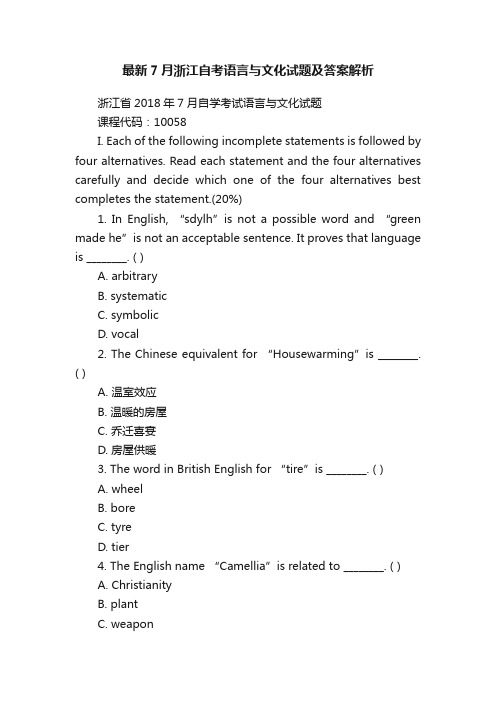
最新7月浙江自考语言与文化试题及答案解析浙江省2018年7月自学考试语言与文化试题课程代码:10058I. Each of the following incomplete statements is followed by four alternatives. Read each statement and the four alternatives carefully and decide which one of the four alternatives best completes the statement.(20%)1. In English, “sdylh”is not a possible word and “green made he”is not an acceptable sentence. It proves that language is ________. ( )A. arbitraryB. systematicC. symbolicD. vocal2. The Chinese equivalent for “Housewarming”is ________. ( )A. 温室效应B. 温暖的房屋C. 乔迁喜宴D. 房屋供暖3. The word in British English for “tire”is ________. ( )A. wheelB. boreC. tyreD. tier4. The English name “Camellia”is related to ________. ( )A. ChristianityB. plantC. weaponD. knowledge5. ________ can represent the geographical aspects of culture. ( )A. KoalaB. CowboyC. QueenD. Hot dog6. If a student wants to express his gratitude for professor’s help, he can say ________. ( )A. “I am so sorry that I am wasting your time.”B. “I hope I didn’t disturb you.”C. “Don’t you mind I disturb you?”D. “Thank you so much. I really appreciate your help.”7. When an Englishman says “I was only pulling your leg”, he means ________. ( )A. I was only trying to prevent you from making progress.B. I was only warning you.C. I was only joking.D. I was only asking you for help.8. The first week day after Christmas, a legal holiday in England, Wales, Northern Ireland, New Zealand, Australia and South Africa, is called ________. ( )A. Boxing DayB. EasterC. Thanksgiving DayD. St. Valentine’s Day9. “To ride one’s high horse”means ________. ( )A. to be naughtyB. to be energeticC. to be arrogantD. to be optimistic10. “________”illustrates the metaphor that ideas are commodities. ( )A. What he said left a bad taste in my mouth.B. Those ideas died off in the Middle Ages.C. Mathematics has many branches.D. There is always a market for good ideas.11. ________ is a detective or shrewd person who has the uncanny ability to solve any mystery through careful observation, scientific analysis, and logical reasoning. ( )A. RomeoB. ShylockC. Sherlock HolmesD. Napoleon12. It is generally accepted that at the sentential level ________ relations are observed far more frequently in English than in Chinese. ( )A. logicalB. hypotacticC. paratacticD. hypocritical13. “They are uncontrollably attracted to each other”is a metaphorical expression about love is ________. ( )A. a physical forceB. madnessC. magicD. patient14. American and British English are two ________ of the English language. ( )A. formsB. varietiesC. languagesD. speeches15. “He showed no pleasure at hearing the news. Instead he looked even gloomier.”demonstrates ________ relation between the two sentences. ( )A. an adversativeB. a causalC. a temporalD. an additive16. “A white hope”refers to ________. ( )A. a talent person who is thought not likely to bring successB. a talent person who is thought likely to failC. a talent person who is thought likely to bring bad fateD. a talent person who is thought likely to bring success17. “Crossing one’s forefinger and middle finger”signifies ________ in English speaking countries. ( )A. secrecyB. sadnessC. respectD. good luck18. “Red handed”corresponds to ________. ( )A. 现行犯的B. 革命党的C. 精力充沛的D. 红色政权的19. ________ style is used for conversations between close friends, colleagues or classmates about topics that are not serious. ( )A. FormalB. ConsultativeC. CasualD. Intimate20. When doctors touch their patients in a physical examination, we call it ________ touch.( ) A. functional-professional B. friendship-warmthC. socio-politeD. love-intimacyII. Each of the following incomplete statements is followed by four alternatives. Read each statement and the four alternatives carefully and decide which alternative can complete the statement. There might be more than one correct answer. (10%)1. In its narrow sense culture is ________. ( )A. the attributes of manB. life way of a populationC. called “academic culture”D. called “anthropological culture”2. Words positive in meaning in English but pejorative or neutral in Chinese are ________.( ) A. aggressive B. self-made manC. individualismD. equalitarianism3. Names include ________, full names, with or without a title. ( )A. titlesB. surnamesC. nicknames or pet namesD. given names4. ________ refers to a person who is too cheap to take hisgirlfriend out so he takes her to his home all the time. ( )A. CouchwarmerB. Ladies’ manC. HippieD. Chauvinist pig5. English pronouns are marked for several cases: ________. ( )A. subjectiveB. objectiveC. genitive determinativeD. genitive independent6. ________ are acceptable forms of address in English. ( )A. Mrs. WhiteB. Mr. JackC. Miss SmithD. Accountant Black7. In English culture “grey”is often associated with ________. ( )A. an old ageB. gloomyC. vigorD. something unpleasant8. “To carry the ball”is an allusion, ________. ( )A. referring to have the main responsibility for getting a task or job doneB. referring to have a very enjoyable timeC. derived from American footballD. derived from rugby9. In English culture the general rule is to introduce ________. ( )A. a man to a womanB. a superior to an inferiorC. the host to the guestD. an individual to a group10. Blue Monday conveys the meaning that ________. ( )A. one is in his sad moodB. one should remember the important dayC. one is in his gloomy moodD. one always has had fortune on that dayIII. Each of the following statements has an underlined space. Fill in each underlined space with a proper expression. (24%)1. The leader of the British government is called ________.2. The American English equivalent for “lift”is ________.3. The English equivalent for “做无米之炊”is ________.4. The Chinese equivalent for “cooker”is ________.5. Morphemes can be classified into two categories: inflectional and ________ morphemes.6. It has been claimed that English texts develop ________, while Chinese ones develop in a spiral way.7. “注意言行举止”corresponds to “________”in English.8. All languages have kinship terms and distinguish at least three characteristics in relatives: ________, blood relationship and sex.9. ________ refers to a play in which comic elements are combined with more tragic or absurdly evil ones, with the latter on the whole predominating.10. ________ refers to prejudice or discrimination based on sex, especially, discrimination against women.11. The English equivalent for “杂种狗”is ________.12. Edward Hall suggests that there are three different time systems that might be found in cultures. They are ________, formaland informal time systems.IV. Translation.(16%)A. Translate the following into Chinese. (8%)1. Superior2. Pride goes before a fall.3. high school4. a marriage of convenienceB. Translate the following into English. (8%)1. 拜年2. 北京大学位于中国北京市海淀区颐和园路5号。
浙江7月高等教育自学考试现代汉语试题及答案解析
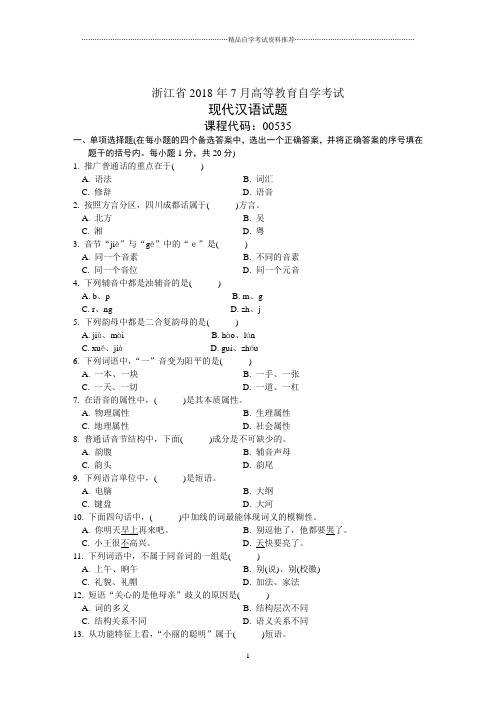
浙江省2018年7月高等教育自学考试现代汉语试题课程代码:00535一、单项选择题(在每小题的四个备选答案中,选出一个正确答案,并将正确答案的序号填在题干的括号内。
每小题1分,共20分)1. 推广普通话的重点在于( )A. 语法B. 词汇C. 修辞D. 语音2. 按照方言分区,四川成都话属于( )方言。
A. 北方B. 吴C. 湘D. 粤3. 音节“jiē”与“gē”中的“e”是( )A. 同一个音素B. 不同的音素C. 同一个音位D. 同一个元音4. 下列辅音中都是浊辅音的是( )A. b、pB. m、gC. r、ngD. zh、j5. 下列韵母中都是二合复韵母的是( )A. jiù、màiB. hào、lúnC. xuě、jiàD. gui、zhōu6. 下列词语中,“一”音变为阳平的是( )A. 一本、一块B. 一手、一张C. 一天、一切D. 一道、一杠7. 在语音的属性中,( )是其本质属性。
A. 物理属性B. 生理属性C. 地理属性D. 社会属性8. 普通话音节结构中,下面( )成分是不可缺少的。
A. 韵腹B. 辅音声母C. 韵头D. 韵尾9. 下列语言单位中,( )是短语。
A. 电脑B. 大纲C. 键盘D. 大河10. 下面四句话中,( )中加线的词最能体现词义的模糊性。
A. 你明天早上再来吧。
B. 别逗他了,他都要哭了。
C. 小王很不高兴。
D. 天快要亮了。
11. 下列词语中,不属于同音词的一组是( )A. 上午、晌午B. 别(说)、别(校徽)C. 礼貌、礼帽D. 加法、家法12. 短语“关心的是他母亲”歧义的原因是( )A. 词的多义B. 结构层次不同C. 结构关系不同D. 语义关系不同13. 从功能特征上看,“小丽的聪明”属于( )短语。
A. 主谓B. 动词性C. 偏正D. 名词性14. 下列词语重叠后行为或属性程度一定会有所加强的是( )A. 尝试B. 说C. 雪白D. 大15. 下列句子中含有插说语的是( )句。
初级俄语练习题及答案

初级俄语练习题及答案(总3页)--本页仅作为文档封面,使用时请直接删除即可----内页可以根据需求调整合适字体及大小--1.写出下列名词的复数形式парк словарь яблоко машинатётя стул поле врач2.写出下列名词的单数第六格形式улица тетрадь слово кухня3.将下列动词变位стоятьучиться4.翻译词组喜爱春天乘车去火车站读书写练习善良的女孩子新书你的老朋友们工程师和他的妻子背单词我们的邻居们5.将括号里的词变成需要的形式1)Наши___________________(мальчик) любятиграть в футбол.2) __________________(Чей) тетрадь на моёмстоле3) Это ваша дочка Как _____________(она)зовут4) Вы разговариваетео____________________(они)5) Анна сейчас в_____________________(общежитие).6) Где ____________________(жить) вашдядя7) Утром мы ___________________(вставать)рано.8) Мычасто ______________________(говорить)по-русски.6.连词成句1)Брат, смотреть, телевизор, а,сестра, слушать, музыка.2)--- Что, вы, делать--- Мы, заниматься.3)Мой, подруга, мечтать, жить, в,Россия.4)Где, ты, завтракать Где,завтракать, твой, муж5)Они, не, хотеть, разговаривать, о,жизнь, и, о, учёба, в, институт.6)Какой, красивый, цветы! Как, я,любить, они!7)Вы, говорить, о, я, или, о, она8)Она, идти, на, лекция.7.汉译俄1)我喜欢学化学,而我的妹妹喜欢学俄语。
浙江7月自考现代汉语基础试题及答案解析
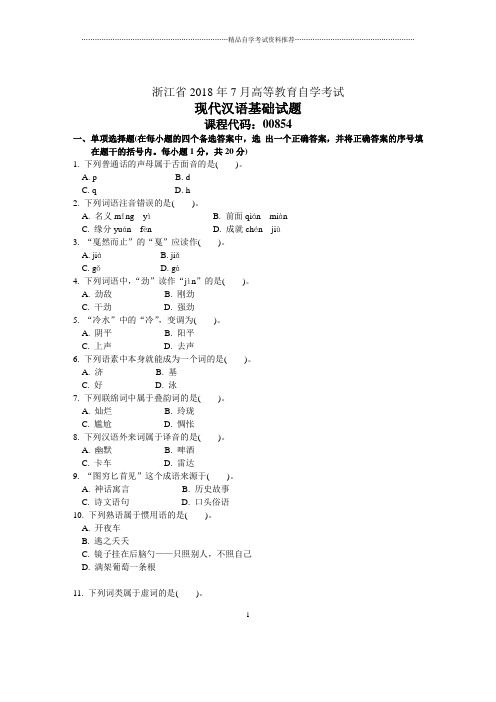
浙江省2018年7月高等教育自学考试现代汉语基础试题课程代码:00854一、单项选择题(在每小题的四个备选答案中,选出一个正确答案,并将正确答案的序号填在题干的括号内。
每小题1分,共20分)1. 下列普通话的声母属于舌面音的是( )。
A. pB. dC. qD. h2. 下列词语注音错误的是( )。
A. 名义mīng yìB. 前面qián miànC. 缘分yuán fènD. 成就chén jiù3. “戛然而止”的“戛”应读作( )。
A. jiáB. jiǎC. gǒD. gà4. 下列词语中,“劲”读作“jìn”的是( )。
A. 劲敌B. 刚劲C. 干劲D. 强劲5. “冷水”中的“冷”,变调为( )。
A. 阴平B. 阳平C. 上声D. 去声6. 下列语素中本身就能成为一个词的是( )。
A. 济B. 基C. 好D. 泳7. 下列联绵词中属于叠韵词的是( )。
A. 灿烂B. 玲珑C. 尴尬D. 惆怅8. 下列汉语外来词属于译音的是( )。
A. 幽默B. 啤酒C. 卡车D. 雷达9. “图穷匕首见”这个成语来源于( )。
A. 神话寓言B. 历史故事C. 诗文语句D. 口头俗语10. 下列熟语属于惯用语的是( )。
A. 开夜车B. 逃之夭夭C. 镜子挂在后脑勺——只照别人,不照自己D. 满架葡萄一条根11. 下列词类属于虚词的是( )。
1A. 代词B. 副词C. 叹词D. 状态词12. “非常”属于( )。
A. 形容词B. 介词C. 状态词D. 副词13. “电影中有几处看来是闲笔,实际上却是______之处。
”划线处应为( )。
A. 别具一格B. 独树一帜C. 不落窠臼D. 匠心独运14. “长虹异彩映万家”,其修辞手法为( )。
A. 比喻B. 双关C. 比拟D. 夸张15. 下列各句语意最重的一句是( )。
浙江7月自考语言与文化试题及答案解析

浙江省 2018 年 7 月自学考试语言与文化试题课程代码: 10058Ⅰ.Each of the following incomplete statements is followed by four alternatives. Read each statement and the four alternatives carefully and decide which of the four alternatives best completes the statement(20%).1.The relationship between language and culture is that _____.A. language determines cultureB. culture determines languageC. language and culture are parallelD. language and culture interact2.Body language normally includes ______.A.gesturesB.gestures, facial expression, distance held between interlocutorsC.facial expressionD.distance held between interlocutors3.While “handsome woman ” and“pretty woman” are both acceptable, they suggest different kinds of attractiveness because of the ______ associations of these two objectives.A. collocativeB. affectiveC. connotativeD. thematic4.Trinity refers to union in one Godhead of three persons, Father, Son and ______A. PuritanB. GodC. Holy ghostD. Ghost5.A hot, freshly cooked sausage sandwiched in a split roll of bread is.A. hot dogB. sandwichC. hamburgerD. pudding6.Facilities where people get served without having to leave their cars called ______.A. drive-insB. motelsC. dinnersD. hotels7.A game played on horseback by two teams of 3 or 4 players is called ______.A. poloB. hockeyC. golfD. rugby8.Donkeywork conveys the similar meaning in Chinese ______.A. 让驴干的活B.不是驴干的活C.苦役D.笨活9.Deductive argumentation has been related to ______A. the linear thinking patternB. the branching thinking patternC. deductive reasoningD. direct sentence10.“ Lily ” means ______ in Chinese.A. 莉莉B. 百合C.石南花D. 牡丹11.“Edgar” means ______ in Chinese.A. 华美的矛B. 埃德加C.武器之王D. 矛之王12.In English speaking countries you usually introduce ______, not the other way round.A. a woman to a manB. a man to a womanC. an old man to a young womanD. an old woman to an young man13.English speakers usually give small gifts to ______ on his or her birthday.A. a new acquaintanceB. a good friendC. a public servantD. a casual friend14.If you are looking forward to something, you ______.A. expect it to happenB. make some progressC. dislike itD. are afraid of it15.English idiom “ look at ” corresponds in meaning to ______ from Latin.A. inspectB. watchC. respectD. read16.“ My knee only hurts when I dance, that because’s I have two left feet” .The last sentence means ______.A. that ’s because I have to be independentB. that ’s because I have recovered after an illnessC. that’s because I dance swiftlyD. that ’s because I am too clumsy17.“ A big fish in a small pond” means ______.A. 小池塘养大鱼B. 鸡窝里飞出金凤凰C.人小干大事D. 鹤立鸡群18.“ To keep one’s own company ” means ______.A. not mixed with others in a friendly or social wayB. to be independentC. to be selfishD. to be egocentric19.“ Let me put in my two cent ’s worth ” means ______A. let me speakB. let me sleepC. let me readD. let me laugh20.“ A green Christmas ” refers to ______.A. a Christmas with vigor and energyB. a Christmas full of jealousyC. a Christmas without snowD. a Christmas with fruit and vegetablesⅡ.Each of the following incomplete statements is followed by four alternatives. Read each statement and the four alternatives carefully and decide which alternative can complete the statement. There might be more than one to four correct answers.(10%)1.Words positive in meaning in English but pejorative or neutral in Chinese are ______.A. aggressiveB. self-made manC. individaualismD. equlitarianism or egalitarianism2.“ Attain ” ,“ acquire” ,and “obtain ” came from ______.A. FrenchB. English originC. Old NorseD. Latin3.There is truth in that ______.A. in Chinese we do have to use explicit formal markers to convey the passive meaning.B. implicit passive sentences are used frequently in Chinese.C. the obligatory explicit grammatical markers are larger in number in English than in ChineseD. the obligatory explicit grammatical markers are used more frequently in English than in Chinese4.It is quite common for students to call their professor ______.A. RobertB. Professor HarrisonC. Robert HarrisonD. Professor Robert5.Normally English people give small gifts to ______ at Christmas.A. good friendsB. their childrenC. casual acquaintancesD. public servants6.“ To knock out ” means ______.A. to make unconsciousB. to finish somethingC. to make inoperativeD. to make useless7.______illustrate(s)the metaphor that life is a gambling game.A. The odds are against meB. He is a real loserC. I ’m charmed by herD. She is besieged by suitors8.The red color is usually associated with ______.A. celebrationsB. communismC. certain emotions such as anger, shynessD. blood shedding9.______is (are) taboo(s)in either English or Chinese.A. Swear wordsB. Profane oathsC. Obscene wordsD. Privacy10.Deductive refers to ______.A. reasoning from the general to the particularB. reasoning from the particular to the generalC. the main thesis preceding the supporting informationD. the supporting information preceding the main thesisⅢ.Each of the following statements has an underlined space. Fill in each underlined space with a proper expression(12%).1.______is the supreme legislative body of the U.K.2.A dark-leaved evergreen plant whose white or purple flower blossom during winter months is called ______.3.A sweet dish typically composed of fruit and flour and fat, boiled or steamed, or of fruit baked with pastry is called ______.4.Staring,or gazing, in Chinese culture, shows one ’s curiosity while in English culture,is considered impolite and ______.5.The Chinese equivalent for“ Lover” is ______.6.The word in American English for“ mackintosh is ______.7.The word in American English for“ timetable” is ______.8.The word in British English for“firecracker” is ______.9.______means a cattle herder on a ranch, especially, one who works on horseback.10.______relations refer to constructions whose components are linked in meaning through the use of conjunctions.11.The English equivalent for“人不犯我,我不犯人”is ______.12.______refers to paradise, derived from the garden in which Adam and Eve lived.Ⅳ.Answer the following questions briefly.(12%)1.What ’s the difference between “ spiritual ” and “精神” in relation to their connotative meaning?2.How to translate“ busybody” into Chinese?3.What ’s the English equivalent for“趁热打铁” ?4.Can“李处长” be translated to “Director Li ”?5.What is“ Chauvinism” about?6.How would you explain in relation to culture the metaphorical statement“ He’s as timid as a mouse”?7.What does the euphemistic expression “ involuntarily leisured ” mean?8.What are the American English equivalents for“ cellar” and“ pail” ?9.What are the British English equivalents for“one-way ticked” and“ round-trip” ticket?10.From which language is the word“chowder” borrowed? What does it mean in Chinese?11.What does “ a Judas” allude to?12.Who created the victory gesture?Ⅴ .Translation(16%)A: Translate the following into Chinese(8%)1.Don ’twear out your welcome2.Wine and wenches empty men ’s purses3.Not to mince one ’s words4.Man proposes, God disposesB: Translate the following into English(8%)5.黄道吉日6.潘朵拉盒子7.白金8.为避虎穴,落人狼窝Ⅵ .Define the following terms(10%)1.terms of humility2.inductive argumentation3.primary territory4.the Australian timeⅦ .Discuss the following topics.(20%)1.List several proverbs to discuss individualism in English culture.2.What differences are there in eye behaviors between English and Chinese nonverbal communication systems?。
- 1、下载文档前请自行甄别文档内容的完整性,平台不提供额外的编辑、内容补充、找答案等附加服务。
- 2、"仅部分预览"的文档,不可在线预览部分如存在完整性等问题,可反馈申请退款(可完整预览的文档不适用该条件!)。
- 3、如文档侵犯您的权益,请联系客服反馈,我们会尽快为您处理(人工客服工作时间:9:00-18:30)。
i浙江省2018年7月高等教育自学考试俄语试题课程代码:00839请将答案填在答题纸相应位置上一、单项选择题(在每小题的三个备选答案中,选出一个正确的,将其号玛写在 答题班题后的括号内,每小题L5分,扶45分)I ・ _____ 3TO McypHaji ?A.HeftE,HteB 月阴 2.3TO nnomajibA. UlfipOKHK b uinpoKaj]B* mHpoKoe3+y Bac cero^Hfl?A” KaKaa E H KaKkeB. KaKae4. *- 3TO ? —3TO KHMra.A. K TO E. M TOB. H (,e5ToBOpHTe ! H nnoxo cubiuiy.A h rpoMMeB. rpoMKe B. rpaMKee6,CTyzKHTtj nomjiH __________ MKUHIO ” A, B 7.B ropo^c MHOroE, Ha * B. KA. 3as<i4a 反 3&BOaB. 33BOJIOB 8.B HMTajibHe 円etjiba 覓 KypnTt.A. H3C B ・ HaNinB. HaM 9Q HH ^py3i>s. A. GonbiHHe E + ^ojTHiiaa B, UOJTEjLilOe 10+O H y oKHa ・A” CTOHT B. CTOHCT B.CTOHTb 1 LO H HQCTO 3aiiKMaercH B HHTa.lbHe. A. MSTeMaTHKOW E. MaTCMaTHKe B.MaTeMaTMKy 12. ______ ,noMcaayiiCTa, me noHTa?A H < Ka>KHTe Cxa^aTb B. CwKyr 13. Bee Mbi xopomo. A.OTJLMXaEOT b.OTJIOXHyT B.oT^Bixaexi 14. PeGjrra, wrpaibB 6acKeT6on!A. noiiTn B, nofi^eMB. nowjyT2A. y'lHTenb E. yMHTCJIK)B. yHHTejiH16. Hima HTO G MT My3biKyA. cjiymaTb 5. nocnyiuaTbB. cjibimaTb17*HMTaiiTe 3a ■A« MHC E. MEH 刃 B t MHOfi IS.M OH Ae^yujxa JKHBeT B .A. AepeBHeH.卫已p 已BHH B. AepeoHeH19.Bnepa y HacHHTCpeCHBlit JOKJia/l.A. SbiJioB. GbiJia B, SbTJi 1 5.H xopouio 3TtaiO STOFO 2O.Ka>K3biid, ______ Bbt BWAHTe 3/iecb, xopouio roBopwT no-pycckn. A. KOFO E. KOTOporo 21 .MaTh ― AOMa He^ejiio. A ・ 0T4bixa_na B. oT^oxnyna 22. «Bbi Macro 一… B naps? —JJa + qacnx A, XOAHTb E h XOjlMTe 23. M M 口OJIPO exann Ha 3aso4 na _______ + A,aaroGyc B ・ aeroCycoM 24. ______________________ 刃 nony^HJi HHCEMO OpaTa. A+ or H h H3 25.O1IU CMOTpAT ©yTSori ______ TeneBH3opy A, no E. y 26. ______ y Hac scema SbTBaioT ©HJibMbL A,Ka>K^yEo cyfiGcny 氐 KaacAa^ cy66ora 27T X OTA TiKcaTejib jiewtaji E 6ojTbHHiie t ___________ paccKa3bi. A. a 283aBOA, A. r^e 29-H 啦 o, A. HTo6bI B. KTO B H OT ^OXHCT B ・ B. aBTo6yce B. oKonoB. B KaiK^yKj cyDooix OH npo^oji>KajT nncaTb 30.0H nociynaeT THK ,A + KateE, H .Mbj peiiiHJiM noexarb, oneHb Gojibmow. b Kyua B, K3K OHH XOpOLHO nOHHJH 3TO. E . HTO oreu roaopHT- B. xaK 6》GTO B” H0 B. nycTb B. 4TO 二、填空题〔将括号内的词构成适当的形式填入答题纸空格内,毎空格1分.共15分) 31.OTeuc _______ (cun) nomnw B can. 32.M OM MATS pafioTaer H __________ ( Gojibinoii) GojibHHue.33.Bnepa eMy ________ (CTaTb) n^oxo,34+B ayqHTopw ________ (HMKTO) HUT+35+M OM cecTpa KyiiMjta _______ (MHTepecHbift) KHwry,36.— ______ (Bbi) noHSTHO? --JJa, noHHTHo.37.Ha ______ (3Ta) yjTHue Haxo^MTCH HOBMH TeaTp,38.nepBoe ynpaiKHeHMe no rpaMMaTHKe _______ (TpyAHMH) ,HeM BTopoe.39.nycTB OH caM STO_______ (c^ejiaTb)・40.Bnepa _______ (OHA) HC G MJIO AOMH.41 .3TO KHwra M He _______ (Hy%Hbin).42.y MeHH AB3_______ (6par).43,HaM HJQKHO wjynaTb npnpo^y,(0Kpy>KaTb)(现在时主动形动词)Hac.44* JJeepb 6bina ________ ( oTKpbiTb ).45* ______ (3aKOHqnTb)(副动词)paSoTy, Mbi SyaeM oTAMxaTb.三、联词成句(将所给的词联成完整的句子,写在答题纸上,每句3分,共応分)46.3aBTpa, y, MU, AOMS, Stub, FOCTH.47.Bnepa, n t BH^eTb, MOH, npyi; B t SH^nnoreKa. 48.3aBawTe, nocMOTpeTb, 3TOT, HOBbiil, KapTMHa・49.Becb, OHM, OHCHB, ycTart, OT, paGoTa.50.H巳uajr巳KO, OT, Ha山,JIOM, nocTpowTh, Soibuiow, snaHn只,He^aBHo.四、阅读理解(阅读以下短文,并回答文后所提的问题'将正确答案的号码写在答题纸题后的括号内,毎小题2分.共10分)B KHHOEbiJia cy66oTa. JI M H WH H Ban JlHHb peuiMJiw nocMOTpeTb 4)n:tbM<repoH» .3TOT 4)HJIWM men B KHHOTeaTpe《rio6eda》■3a Gu^eTawH nomen JI H H HH* llepezi KHHOieaTpoM Tojinmioci,(聚集) MHoro Hapo^y. JI KJ^H >Kaanii G HJICTOH C pyK (退票)* B Kacce na cenoAna y)Ke HH l iero Tie ocTajioct. JI H H HHY口pe^jroxcwjiM GpiJieTBi Ha 3aBTpa+ O H wymn ^Ba GHJieTa Ha nepstEH ceaHc (电影等的场).MecTa xopouiwe —BocbMoe M ^ecsToc B necHTOM psuiy.Ha Apyrow jieHb npygbx BMecTe nouuiH B KMHO. U>nnbM 3aMe4aTenbHhJitO HH CMOTpejin ero c orpoMHbiM y/iOBOJibCTBweM. Kocua OHK IJJJIW W3 KHiioreaTpa, eme uonro pa3roBapHBajin 06 M^ee M My3biKe dmibxta. 5L4TO peuiwjiH c.nejiaTb JT M H HH H B UH JlHHb B cy66oiy?A.O HH peiuMJiw noexaTh na BMcraeKy.3E.O HH peuiMJiw noexaTb nocMOTperbB.O HH pemwjiH noexaib B My3ew.EO HH pein H JI H noryn^Tb B napKe.52.K TO noiu^Ji 3a GnjieTaMH ?A.JI H H HHE.BaH JIiiHbB.JIw H HH W B HH JI MHEEEpaT Jin H HH违53.KaKne G HJICTB) OHM BIXJIH?A.Ha BTopow ceaHc, B口EBJJTOM puny.E,Ha nepBbin ceaHC, B ACC只TOM psi Ay.B.Ha BenepHnii ceaHC, B .aecHTOM pjmy+r,Ha yTpeHMH ceaHC T B aecaTOM ps^y.54.KaKoe m cneAytoiuwx BbicKa3biBaHHH (说法)npaBHjibHoe?A.riepe^ KHHOTeaTpOM OHeHb Majio jjEo^eti.B.O HH xynHJiH B EJICTM C pyx.B.O HH Kynwjiw owneTbi Ha ?aBTpa・r,OHH He KyntuiH SwjieTbi.55.KaK noHpaBHnca jipy3bHM 3TOT?A.O HH nyMajiM* HTO yro njioxoii ©HJIBM.E.O HH uysiajiH, TTO 3TO He wHTepecHbifi 巾HJIBM.B.O HH口yMann* HTO 3TO 3aMeHaTejTbHbiii 4)wntM.r.OHM He J1K)6W J1M H^eK) M My3bIKy 3TOrO (jiHJlbM乩五、命题柞文(写一篇60词左右的作文,写在答题纸上.共巧分)MOH BblXO^HOH JJEHb4。
